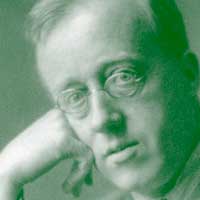Gustav Holst Biography - A Very Quick Guide
Artist:
Gustav Holst
Born:
September 21, 1874, Cheltenham, England
Died:
May 25, 1934, London, England
Gustavus Theodore von Holst was an English composer with Latvian (and some Spanish) roots.
Born in Cheltenham, where he was educated at Pate's Grammar School, he went on to study at the Royal College of Music in London. His best-known work is probably his orchestral suite The Planets, completed in 1916, although the composer himself did not count it as one of his best creations and later often complained that other works were completely eclipsed by it. The Planets (1914–1916) was partly inspired by meditations on his own horoscope/natal chart and dealt with the 'seven influences of destiny and constituents of our spirit.' Holst was especially influenced by a 19th-century astrologer called Raphael, whose book concerning the planets' role in world affairs led Holst to develop the grand vision of the planets that made The Planets such an enduring success.
Holst's relatively small output for the wind band guaranteed him a position as the medium's cornerstone, as seen in innumerable present-day programmes featuring his two Suites for Military Band.
His one work for brass band, A Moorside Suite, remains an important part of the brass band repertoire.
Like many composers, Holst also played a musical instrument, in his case the trombone (a choice dictated by a medical condition that robbed him of the manual dexterity required for more obvious instruments such as the piano).
From 1933 Holst suffered from severe stomach problems. On May 25, 1934 he died of complications, following surgery in London. He is buried in Chichester Catherderal, West Sussex.
His daughter Imogen Holst was also a composer and conductor.
Born in Cheltenham, where he was educated at Pate's Grammar School, he went on to study at the Royal College of Music in London. His best-known work is probably his orchestral suite The Planets, completed in 1916, although the composer himself did not count it as one of his best creations and later often complained that other works were completely eclipsed by it. The Planets (1914–1916) was partly inspired by meditations on his own horoscope/natal chart and dealt with the 'seven influences of destiny and constituents of our spirit.' Holst was especially influenced by a 19th-century astrologer called Raphael, whose book concerning the planets' role in world affairs led Holst to develop the grand vision of the planets that made The Planets such an enduring success.
Holst's relatively small output for the wind band guaranteed him a position as the medium's cornerstone, as seen in innumerable present-day programmes featuring his two Suites for Military Band.
His one work for brass band, A Moorside Suite, remains an important part of the brass band repertoire.
Like many composers, Holst also played a musical instrument, in his case the trombone (a choice dictated by a medical condition that robbed him of the manual dexterity required for more obvious instruments such as the piano).
From 1933 Holst suffered from severe stomach problems. On May 25, 1934 he died of complications, following surgery in London. He is buried in Chichester Catherderal, West Sussex.
His daughter Imogen Holst was also a composer and conductor.
Top Pieces on 8notes by Gustav Holst
Come, Ye Lofty (Holst)
Good Christian Men, Rejoice
Jupiter from the Planets (theme)
Jupiter from The Planets (theme)
Uranus from The Planets
Personent Hodie (Words from Piae Cantiones)
Fantasia on the Dargason from Second Suite in F
Fantasia on the Dargason from Second Suite in F
Scherzo from Moorside Suite
Good Christian Men, Rejoice
Jupiter from the Planets (theme)
Jupiter from The Planets (theme)
Uranus from The Planets
Personent Hodie (Words from Piae Cantiones)
Fantasia on the Dargason from Second Suite in F
Fantasia on the Dargason from Second Suite in F
Scherzo from Moorside Suite
